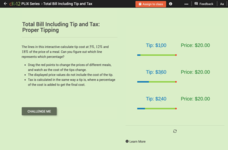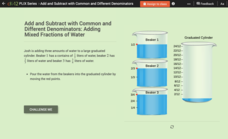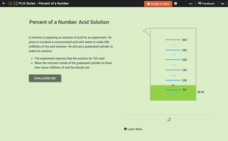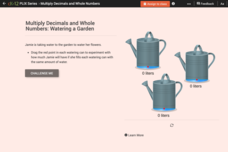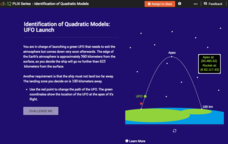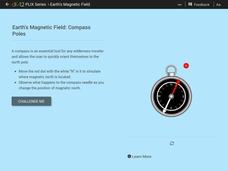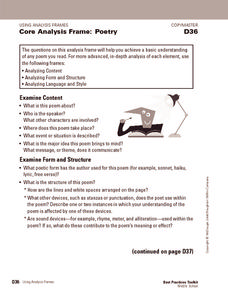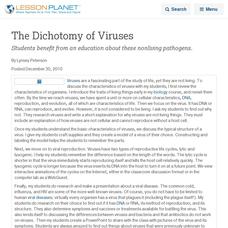Curated OER
Relationship Between Addition and Subtraction
Students are taught how to add and subtract and use number sense to solve basic math problems. For this addition and subtraction lesson, students are being taught using theories from different philosophers in education. They are given a...
CK-12 Foundation
Prices Involving Sales Tax: Proper Tipping
A five-question interactive challenges mathematicians to find a correct tip and total amount using percents five, 12, and 18. A tool with moveable pieces assists participants in locating answers. Types of questions include...
CK-12 Foundation
Expression Evaluation with Different Denominators: Adding Mixed Fractions of Water
An interactive challenges mathematicians to add mixed fractions with unlike denominators. Five questions—fill-in-the-blank and multiple-choice—build from one to the next leading the way to an open discussion about denominators and...
CK-12 Foundation
Percent of a Number: Acid Solution
Mathematicians answer five questions about percents, ratios, and proportions with help from an interactive graduated cylinder. Question types include multiple-choice, fill-in-the-blank, and discussion.
CK-12 Foundation
Estimation to Check Decimal Multiplication: Watering a Garden
Mathematicians solve six multiple-choice and true or false questions using their knowledge of estimation and multiplying decimals. The interactive provides a garden-themed tool that creates a visual aid of three watering cans to assist...
CK-12 Foundation
Identification of Quadratic Models: UFO Launch
Build conceptual understanding of graphs of quadratic functions with an out-of-this-world resource. An interactive lesson allows learners to manipulate a graph that models the launch of a UFO. The lesson focuses on the key features of...
CK-12 Foundation
Seafloor: Sonar Boats
An interactive that teaches about sonar sure sounds like fun! Junior oceanographers study the uses of sonar, past and present, in an engaging interactive. The content demonstrates how sonar works, why sound waves are a great tool...
CK-12 Foundation
Earth's Magnetic Field: Compass Poles
You'll be strangely drawn to this activity! Physical science pupils learn how compasses work in an interesting interactive. The content covers magnetic poles, Earth's magnetic field, and what would happen if Earth's poles swapped places.
Houghton Mifflin Harcourt
Core Analysis Frame: Poetry
Dig deep into any piece of poetry with a set of analysis questions. Ponder the content, form, and language of poetry and provide some question for critique. The first two pages include general questions, and the remainder of the document...
Rural Science Education Program
Bees and Flowers – Partners in Pollination
Why are bees so important? After several activities where kids investigate the form and function of flowers, they learn about the different types of bees and label them. They then examine pollen under a microscope and decide which bees...
Space Awareness
The Big Meltdown
Explore the world (our world) of melting ice caps. Why are these caps melting? What is the effect of melting ice caps? Dive into the ever-present issue of global warming with a resource that has learners looking at data and participating...
Student Handouts
Voting Rights Speech Before Congress
Is your class studying civil rights? Consider taking a look at President Lyndon B. Johnson's voting rights speech. This resource includes an abridged version and three related questions. Pupils consider Johnson's use of language and the...
Core Knowledge Foundation
A Time for All Seasons - Spring
Celebrate the arrival of spring with this fun primary grade science unit. Engaging young scientists with a variety of hands-on activities and inquiry-based investigations, these lessons are a great way to teach children about...
K12 Reader
African American Inventors: Patricia Bath
Young readers practice their comprehension skills by responding to a series of text-based questions on a passage about Patricia Bath, the first black woman medical doctor to receive a patent.
Atkins
Attack of the Viruses!
Not all viruses are bad, but are all retroviruses groovy? The lesson plan starts with a detailed presentation before scholars create their own model of a virus. The resource incorporates many worksheets and practice questions...
NOAA
I Didn’t Do It…Did I?: Make Your Own Greenhouse Effect
How do greenhouse gases affect the climate on Earth? Pupils explore the concept by first building their own apparatuses to model the greenhouse effect. Then, they record data to measure temperature change and determine...
Curated OER
A Rainbow Under the Sea: How Do Animals Survive in the Ocean?
Second graders, with adult help, create a PowerPoint presentation on a selected ocean animal.
Curated OER
Plant Identification: New Jersey vs. Ecuador
Sixth graders discover the different plants that grow in different climates through specimen collections. In this botany lesson, 6th graders examine plants from both New Jersey and Ecuador and discuss what conditions could create...
Curated OER
Teaching Measurement Through Science
Use these lesson plans to give your students real world practice with measuring distance, mass, and volume.
Curated OER
The Dichotomy of Viruses
Students benefit from an education about these nonliving pathogens.
Curated OER
Mandala Art Lessons
Mandala art lessons provide easy and fun ways to learn about art, math, and other cultures.
Curated OER
Abraham Lincoln Lesson Plans
This article illustrates diverse ways to educate high school students about Lincoln, his struggles and what they mean for us today.
Curated OER
Neolithic Agricultural Revolution
Lessons about agriculture during the Neolithic period can provide activities to help student understand this important time.
Curated OER
How Many People Live in Your Household?
Students create a pictograph showing household size for the class.In this data collection and graphing lesson, the teacher guides students through the creation of a concrete object graph, then students analyze and summarize the results.



